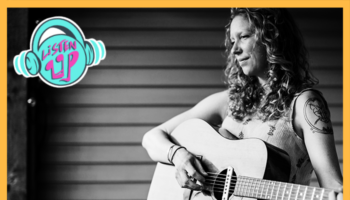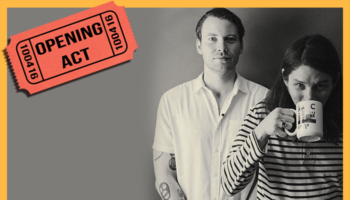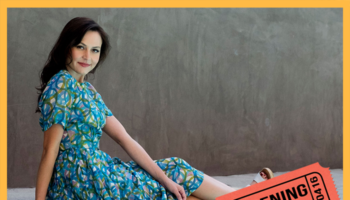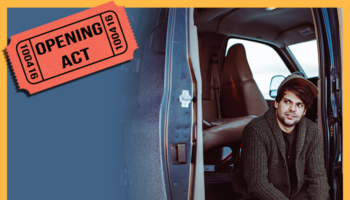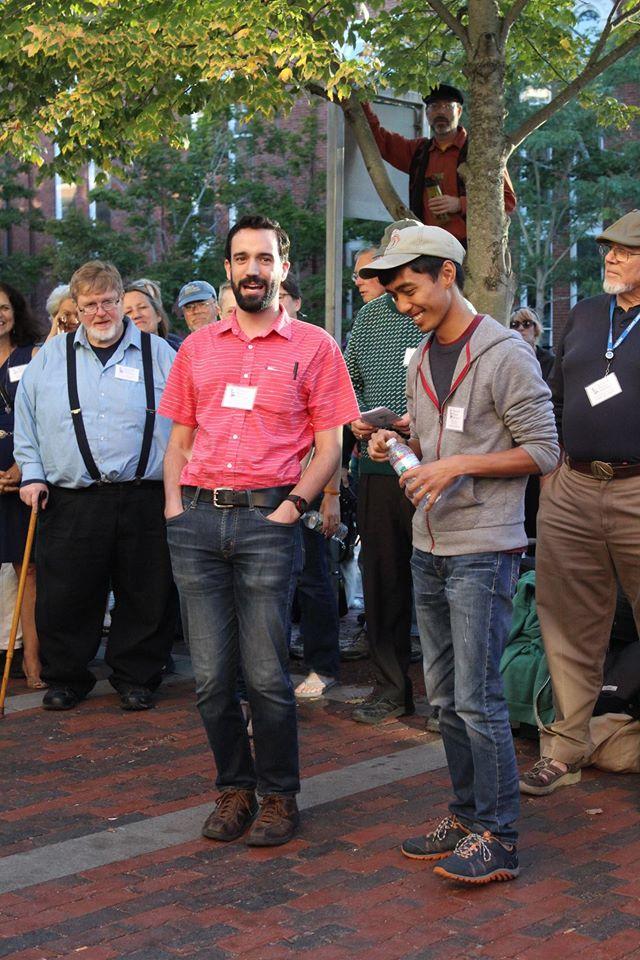 Artist/Band: The Vox Hunters
Artist/Band: The Vox Hunters
Members: Armand Aromin & Benedict Gagliardi
Website: https://thevoxhunters.com/
Hometown: Providence, Rhode Island
Latest Album/Release: debut album to be released in May/June
Influences: (There’s a lot!)
Jeff Davis & Jeff Warner, John Roberts & Tony Barrand, Will Duke & Dan Quinn, Almeda Riddle, Jeanne Ritchie, David Jones, Jerry Epstein, Bob Walser, The Watersons, The Copper Family, The Young Tradition, Doc Watson, Swan Arcade, Folly Bridge, Keith Kendrick & Sylvia Needham, David Webber & Anni Fentiman, Louisa Jo Killen
TrunkSpace: How would you describe your music?
Gagliardi: The majority of what we do is traditional folk music… old songs and tunes usually without known composers that have been passed down through the oral tradition. We come from an Irish music background where instrumental dance tunes (jigs, reels, etc.) reign supreme, but as a duo we primarily sing English and American songs. People often get confused and expect only Irish music out of us, but aside from the odd tune that I play for Armand to dance to, our repertoire as a duo is not heavy on the Irish music.
We also write some songs ourselves and sing other songs written by folk musicians, but they all share a certain humble aesthetic and fit comfortably in the folk music idiom. That being said, we recognize a good song when we hear one and we welcome a bit of musical varia that strays outside the folk music realm. We’re not averse to singing the odd Muppets song now and again.
TrunkSpace: The Vox Hunters have a unique sound. How did you come to discover your musical identity together?
Gagliardi: As I’ve said, we both spent many years playing Irish music, but at the same time we both love to sing. The Irish music communities in New England are close-knit and welcoming and bound together by a love of tunes (‘tunes’ meaning instrumental dance music… no words), but there is not a similar reverence for songs (i.e. with words) in these circles. In our experiences, singing at Irish music sessions is a rare solo occurrence that usually gives contrast to the upbeat medleys of dance tunes.
Aromin: Prior to meeting Ben, which was about 4 ½ years ago, I only really knew Irish music. Singing was very much a ‘hobby’ among my musical endeavors, but when we met, he introduced me to a whole facet of folk music that I never really knew existed. I’m a big fan of harmony, and singing has allowed me to explore that. You won’t find much of that in Irish music; however, it’s fairly common in other styles of folk music like English, Swedish, and bluegrass.
Basically, our musical identity is a happy cornucopia of many different influences. Our main drive is singing… singing together, singing with others, singing socially, and building community around singing rather than tunes.
TrunkSpace: Armand makes and repairs violins. Does understanding the inner workings of an instrument make you approach the play aspect differently than say, someone who doesn’t have an understanding of that side of the instrument?
Aromin: I can’t speak for others, but being a luthier has certainly changed the way I approach playing an instrument. Prior to enrolling in the Violin Making and Repair program at the North Bennet Street School in Boston, I was always under the impression that an instrument only sounds and plays the one way. If it doesn’t suit you, then it’s time to find a different instrument. I’ve since learned that is false as hell. There are a multitude of ways you can change how an instrument feels, and it all lies in the set-up. More often than not, this becomes a distraction for me, especially when an instrument I’m playing isn’t behaving the way it should. I’ll sometimes get lost in my head thinking of what needs to change, how I can go about doing it, and when’s the next time I have a free day. On the other hand, it’s nice to be able to work on my own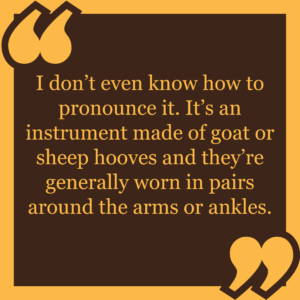 instruments and save money.
instruments and save money.
TrunkSpace: Your music seems suited for small, intimate settings, but at the same time, capable of filling the air (and ears) of a large venue as well. Do you approach a live performance differently based on the setting you’re performing in?
Aromin: As far as stage presence is concerned, we try to be consistent regardless of the venue. Repertoire is another story, but we like to maintain the laid-back, silly atmosphere wherever we perform. Not only does it make it easier for us as performers, but it also makes it more fun, and helps to get that exchange of energy going between us and the audience. We love participation, so we often sing songs with choruses that are easy for people to latch onto. It can be tough performing for a crowd that isn’t used to something like that, especially if we’re on a bigger stage and the audience is further back, and even more awkward when we’re being our usual selves and there’s zero response from them. That’s why our favorite venues are house concerts. It pays better, you get to hang out and chat with everyone, there’s usually food, and you can count on an enthusiastic audience to keep you going.
Gagliardi: Like Armand said, no matter the venue, we are consistent in our informality. Feedback from listeners has taught us that people enjoy hearing a good bit of banter between songs, some background stories, and observing our laughable/affable (laffable?) chemistry on stage.
When we perform at larger venues we usually have a better prepared set list than a house concert or smaller, casual gig. Part of the thrill of playing more intimate concerts is that the mood of the space might dictate the set list and we’d be more inclined to ‘wing it’. For instance, if people are singing along from the start, we keep the choruses coming.
TrunkSpace: Benedict has performed in a number of folk bands throughout the years. What did you learn in terms of the inner workings of managing a musical act during your time with those other projects that you have since applied to The Vox Hunters?
Gagliardi: One band I was part of (Old Hannah) was wildly creative and drifted off into musical territory I had no firm grounding in. That was always a fun exercise and helped to encourage an adventurous approach to arranging and interpreting folk songs. Playing with Old Hannah, as well as Shinbone Alley, in my college days opened my eyes to the thriving network of house shows and homegrown venues in New England that welcome creative and entertaining performers. These experiences taught me the joy of performing for small, music-loving audiences. It was with Shinbone Alley that I first played a house show in Providence and fell in love with the supportive and genuinely appreciative music scene that I would eventually become a part of.
Another group I was part of (Full Gael) was immensely adept at learning particular arrangements of tunes and songs and performing them consistently and professionally. Any bit of professionalism I demonstrate as a musician was shaped by my involvement with Full Gael. Likewise, my bandmates (Gary Palmer and Will O’Hare) taught me the business aspects of music and helped to strengthen my harmony singing.
TrunkSpace: You’re currently recording your first album. Can you tell us what fans can expect?
Gagliardi: If I may say so in a modest, non-bragging way, we know LOADS of songs in a variety of different styles (i.e. sea songs, ballads, drinking songs, love songs, gospel, etc.). Some we only ever sing a cappella and in the right setting, some we like to arrange with instrumental backing, some we’ve modified the melodies and lyrics of and harmonized in unique ways. What’s fun about singing traditional folk music is the variety of songs and styles and the ways you can reinterpret it. It’s hard to pinpoint a specific style that is most representative of our music, but I think the variety of songs we chose to include on the album does a decent job of describing what The Vox Hunters do. You can expect old American folk songs, a ballad or two, maritime songs, a bluesy number, some ditties from the British Isles, two originals, a couple of unusual dance tunes, and even an Irish song.
TrunkSpace: The Vox Hunters seem to really embrace the wonders of unique sounds and instrumentation. Are you working with any uncommon instruments on this album that we’ll need to Google just to see what they are, and if so, can you tell us what the sounds are that you’re creating with them?
Gagliardi: We’re hoping the novelty of playing uncommon free-reed instruments wears off soon after listeners hear what they’re capable of. We each play different types of “squeezeboxes” (Benedict plays the Anglo-German concertina and 1-row melodeon, and Armand plays English concertina). Other than that, Armand will be heard on tin whistle, jaw harp, and a fiddle of his own make (while sometimes singing simultaneously!). Benedict plays harmonica and tenor guitar (he can’t play ‘normal’ guitar) on a few tracks.
The strangest instrument on the album is probably wielded by our guest percussionist, our good friend Kyle Forsthoff. In the studio, he dumped out a whole bag of shakers, and within the pile was an instrument called the chajchas.
Aromin: I don’t even know how to pronounce it. It’s an instrument made of goat or sheep hooves and they’re generally worn in pairs around the arms or ankles. Kyle just clapped two of them together and it makes a satisfyingly wholesome sound. There’s also going to be Cajun triangle and Snare drum on the album. You won’t find much of that in Maritime music!
TrunkSpace: You’re based in Rhode Island, a state with a rich history of folk music and home to the Newport Folk Festival. What is the folk scene like currently and is it welcoming to new acts looking to make their mark?
Gagliardi: Rhode Island does indeed have a strong history of folk and especially traditional (trad) music. The Newport Folk Festival started as one of the foremost annual presentations of trad folk music highlighting national treasures like Almeda Riddle, Jean Ritchie and Pete Seeger to name a few. From a traditional musician’s standpoint, the festival no longer functions the same way. Although there is still a stage dedicated to traditional folk music, the festival’s focus has since shifted towards the more popular music of today.
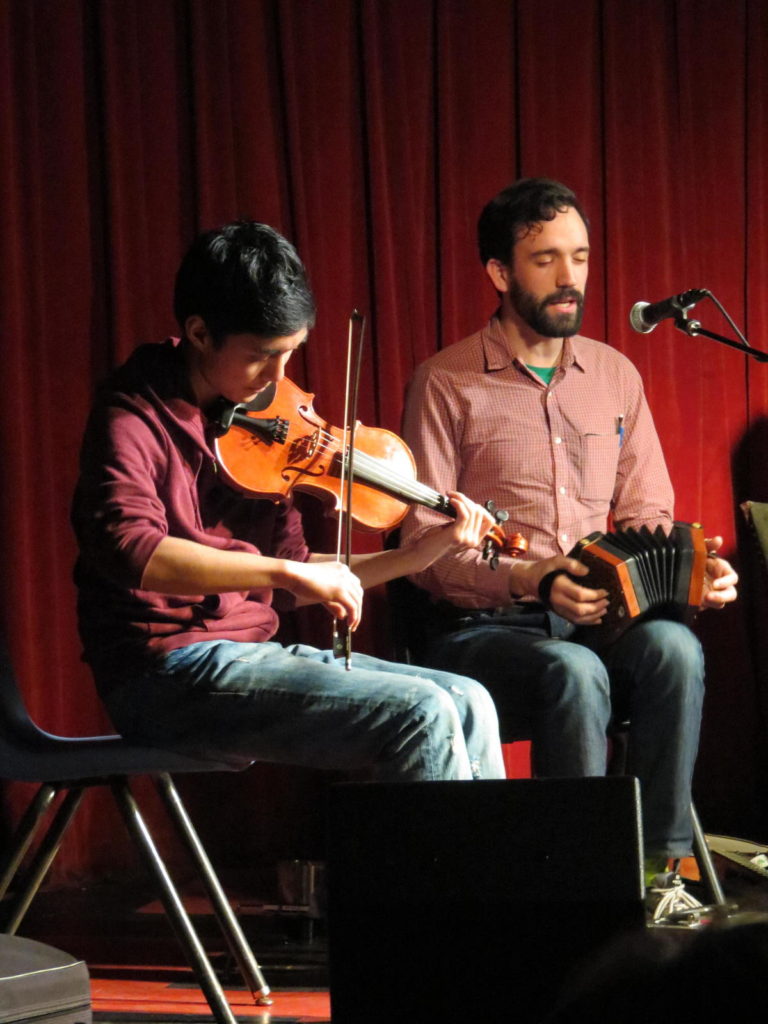 Today Providence is rich with a variety of music, and more importantly, musicians who respect and support the art of others and are willing to collaborate. Wikipedia will tell you that Providence’s main musical export is noise rock, but I can tell from experience that the city is teeming with good singers, songwriters, and instrumentalists. What’s truly wonderful about the music scene here is how different styles intermingle. You might go to a show at a local venue like AS220 or Aurora or The Parlour and listen to something as staunchly traditional as a solo oud player, followed by a local singer-songwriter duo, and then an acoustic metal doom band.
Today Providence is rich with a variety of music, and more importantly, musicians who respect and support the art of others and are willing to collaborate. Wikipedia will tell you that Providence’s main musical export is noise rock, but I can tell from experience that the city is teeming with good singers, songwriters, and instrumentalists. What’s truly wonderful about the music scene here is how different styles intermingle. You might go to a show at a local venue like AS220 or Aurora or The Parlour and listen to something as staunchly traditional as a solo oud player, followed by a local singer-songwriter duo, and then an acoustic metal doom band.
We are very interested in the old songs and traditional music from our state and we’re currently researching, collecting, and reviving Rhode Island’s hidden bounty of old folk music. There are plentiful contemporary folk songs written about the Ocean State’s historical figures, places, and happenings but we are most interested in old songs from the state’s past, such as the many broadside ballads printed in Providence in the 1800s, and the traditional songs collected from RI residents and immigrants in the 1940s for the Helen Hartness Flanders Ballad Collection. You can expect to hear an increasingly Rhode Island-centric repertoire from us as we delve deeper into this research.
TrunkSpace: What can fans expect from The Vox Hunters in 2017?
Gagliardi: First and foremost, fans can expect something more than a business card to be available at our gigs! Our debut album will be released in the next few months! Yahoo!
Additionally, after the recording is done and the album is out we will be focusing much more on our Rhode Island music research. You can expect to hear more local songs in our repertoire in the hopes that others will learn and sing them as well.
This summer you can catch us at a number of New England folk festivals, camps and concerts:
- Mystic Sea Music Festival (Mystic Seaport, Mystic, CT) June 8-11
- Swing into Summer (Pinewoods Camp, Plymouth, MA) June 16-18
- Warren Summer Concert Series w/ Atwater-Donnelly (Warren, RI) July 23
- TradMAD (Pinewoods Camp, Plymouth, MA) Aug 26-Sep 1
- Portsmouth Maritime Folk Festival (Portsmouth, NH) Sept 22-24



